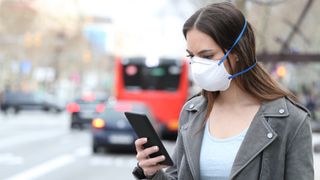UK currently 'too technically limited' for an effective coronavirus app
There are too many technological and social barriers for contact tracing to work properly, a research body claims

Severe technical limitations and social risks may render any contact tracing app launched by the UK government as being useless, a leading technical research institute has claimed.
A host of conditions, which pre-date COVID-19, must be met if the government is to stand any chance of successfully rolling out a location-tracking app to the majority of the British population, according to the Ada Lovelace Institute.
Little evidence suggests the UK could deploy effective contact tracing technology, the institute has established, despite NHSX reportedly working with Apple and Google to build a tool to monitor contact between infected individuals.
A high degree of imprecision in detecting ‘contacts’ between smartphones, for example, could lead to many false positives or false negatives, due to its reliance on several factors including distance and time.
Digital contact tracing could also lead to fraud and abuse, with people using multiple devices or deliberately reporting false infections.
Moreover, the four mechanisms for detecting distance, including GPS, mobile networking signals, Wi-Fi and Bluetooth, each have limitations of their own.
GPS and mobile network signals, for instance, work best outside so would be useless in buildings or underground. Wi-Fi relies on individuals being a part of the same network, while Bluetooth, which is the leading technological contender for developers, is not actually available on all devices.
Get the ITPro. daily newsletter
Receive our latest news, industry updates, featured resources and more. Sign up today to receive our FREE report on AI cyber crime & security - newly updated for 2024.
“Bad uses of data and technology can do more harm than good,” said director of the Ada Lovelace Institute Carly Kind.
“They can obscure accurate analyses, hide abuses of power and exacerbate the position of people already suffering from digital exclusion, who - evidence is beginning to show - are the same people who are most vulnerable to COVID-19.
“While we have seen that the public will support emergency or extreme measures that require curtailment of liberty or agency, or the increase of surveillance, if they appeal to a common sense of solidarity and are clearly justified for public good, there needs to be cast-iron ‘sunset’ clauses to dismantle any data tracking and surveillance architecture, as definitively and transparently as lifting restrictions on physical movement.”
The independent research body, established by the Nuffield Foundation in 2018, has produced a rapid-response review of plans to develop an app that aims to curb coronavirus spreading once lockdown measures are lifted
Some technologies around the world already in development, or under consideration, have failed to consider how technical design can serve efficacy, privacy, governance and transparency, the report said.
The bar must be “exceptionally high”, moreover, with any technology also being open to scrutiny and oversight. Fears around data exploitation, if realised accidentally or otherwise, may cause severe long-term harm to public trust.
Due to severe shortcomings in the UK for a fully-digital contact tracing regime, the app will only be effective if it’s supported by manual contact tracing. This must be based on the work of medical professionals, as well as rigorous and industrial coronavirus testing.
Although the government wants to launch the app in time for lockdown measures to be lifted, expected to be within six weeks, the institute has recommended pausing development to channel resources into alleviating the UK’s broader limitations.
The capacity for testing and manual contact tracing is nowhere near sufficient to meet the level required to render the app effective, moreover. There are also fears over a significant segment of the population who are digitally excluded due to factors from device ownership to a lack of digital literacy.
Based on the UK’s lack of readiness, a Group of Advisors on Technology in Emergencies (GATE) should be urgently established with a remit to examine the evidence for when the UK is ready for an app and establish a timeframe for deployment.
Because interventions using technology ordinarily take into account social implications, too, the government must broaden the range of decision-makers around the coronavirus crisis beyond scientific bodies.
Moreover, contact tracing should form a part of a holistic strategy, with authorities fully transparent about the technologies being developed. This is in order to foster greater public trust and encourage uptake when an app is eventually released, because it’s likely to be released on a voluntary basis.

Keumars Afifi-Sabet is a writer and editor that specialises in public sector, cyber security, and cloud computing. He first joined ITPro as a staff writer in April 2018 and eventually became its Features Editor. Although a regular contributor to other tech sites in the past, these days you will find Keumars on LiveScience, where he runs its Technology section.




